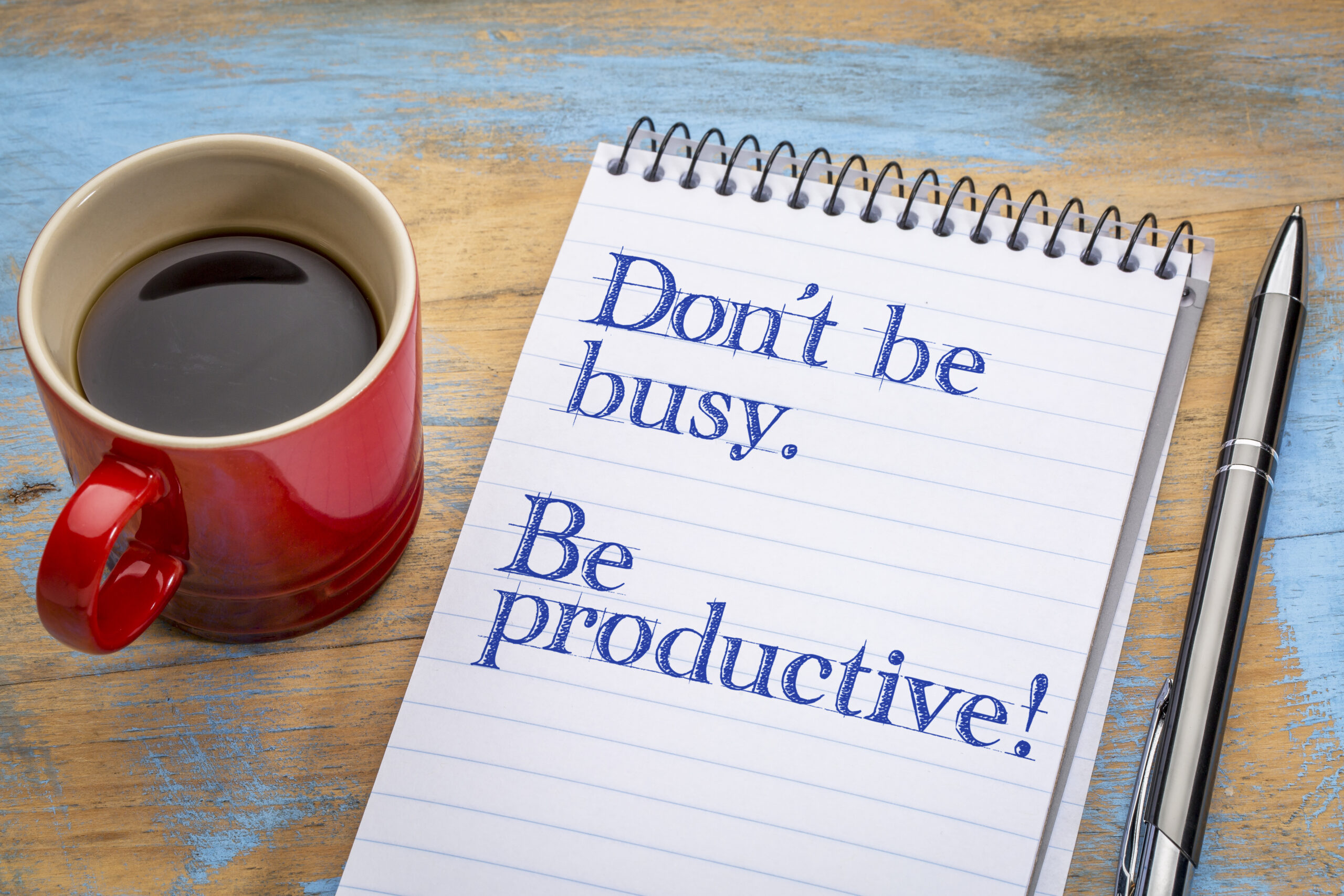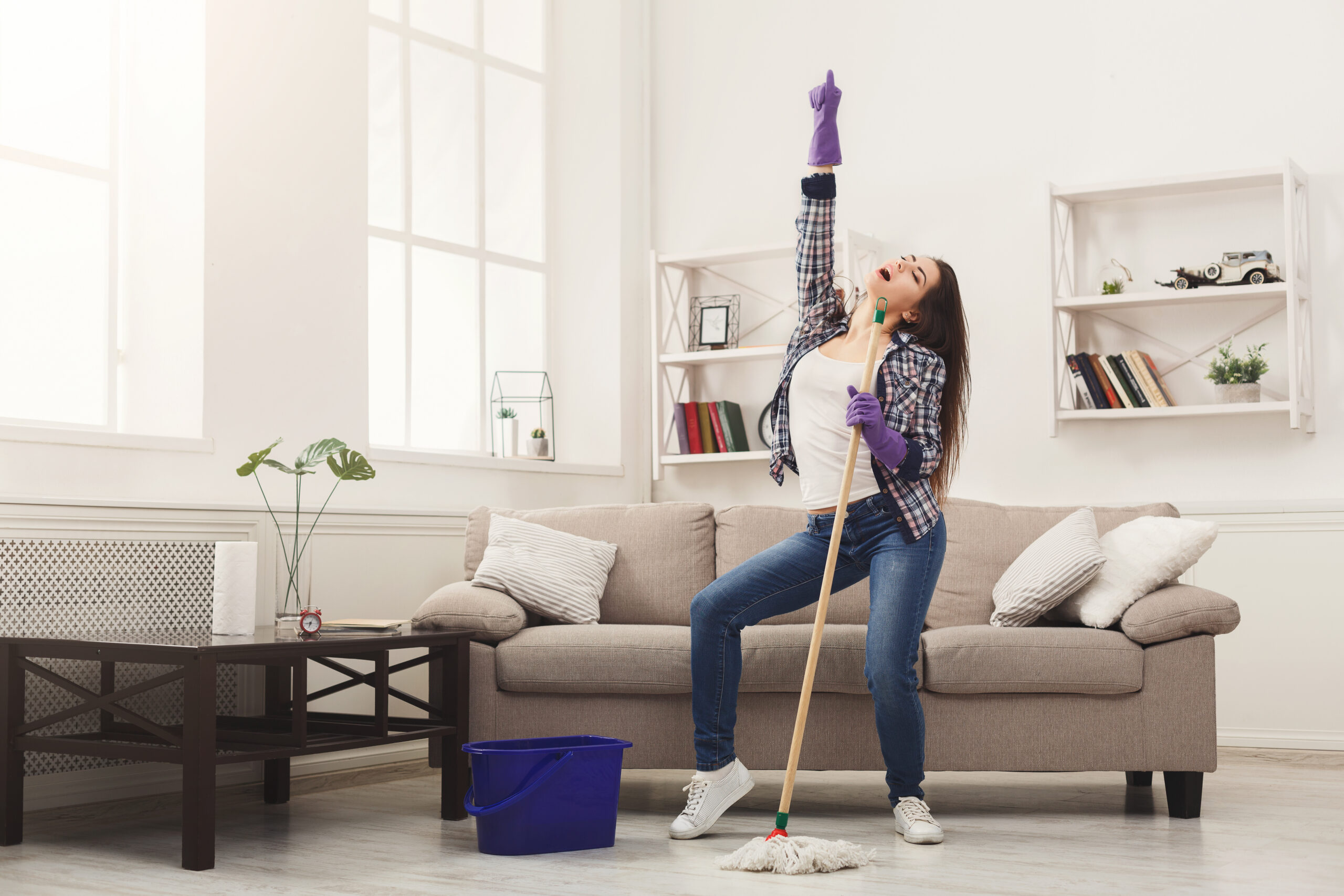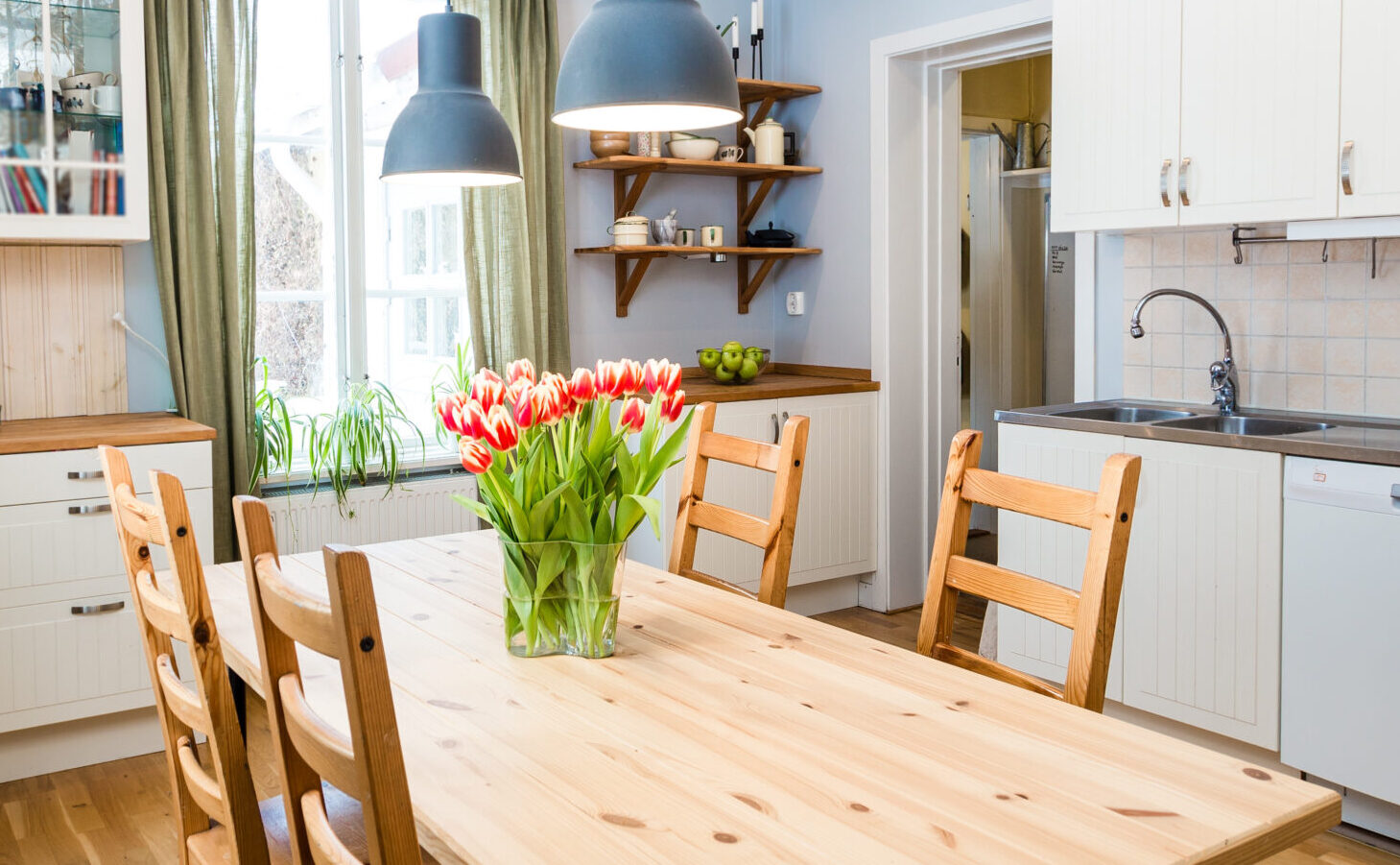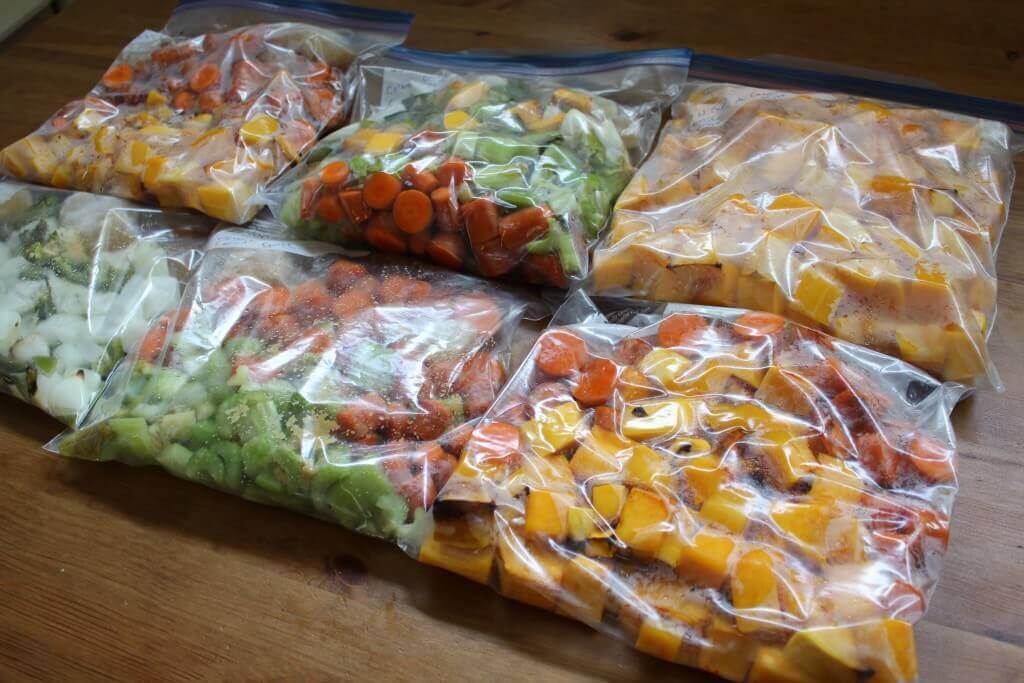Especially right now, it feels like many of us are just barely holding our heads above water. When we try to be more productive, we get frustrated and burn out. In the extreme, we may even be making ourselves sick from taking on too much, beating ourselves up internally, and sleeping too little.
This isn’t about pushing yourself harder, or how to trick your body into not needing rest or sleep. This article will get you more results with the same (or less!) effort.
Effortless Productivity at a Glance:
- Turn off notifications to minimize distractions, even if you think you don’t pay attention to them.
- Choose the most productive thing that you WANT to be doing. It’s so much easier to do what you want to do, rather than force yourself to do what you don’t want to do!
- Complete small tasks rather than working slowly on big tasks to activate your brains built-in reward system.
- Schedule media-free time each week to detox from being always on and reduce overwhelm.
- Batch similar activities.
- You will never shame or blame yourself into increased productivity! Positive self talk and realistic expectations are key.
If you’re like me, and naturally a little scattered and overwhelmed, you’ll find these tips and insights helpful. If you’re naturally organized and clean, you may think this is ‘common sense’ and already be implementing these into your daily routine!
These tips work well for children as well- whether you’re trying to get them to keep their spaces clean, do online school work, improve their self talk, or manage time more efficiently.

1. Turn off your sound notifications for everything but phone calls and alarms.
Attention is a sacred resource right now, and our phones and computers will demand as much of our attention as a toddler if we don’t actively manage it!
While sound alerts can be helpful for getting up on time, getting the kids to activities on time, and remembering dinner is in the oven, unnecessary sound and visual notifications wear you out and make you feel overwhelmed.
Even if you think you tune out the dings and flashes from your phone and computer, tuning them out takes background effort that adds up over the day. With so many of us feeling like we can’t keep up, unnecessary notifications only add to this feeling.
What to do:
- Go through and delete all your reminders and alerts that aren’t relevant any more. Confession: I had a ‘take Levi to soccer practice’ alert that went off every Friday until I wrote this. He stopped this particular soccer practice in October of 2019, which was 11 months ago. Ahem.
- Go into your notification settings, and make sure ‘sounds’ are turned off for email, all social media, and, yes, even texts.
- Let your children and anyone important know that if something is urgent, CALL, don’t text. Most people know this anyway, but a reminder can help you turn off all that noise without fear of missing out or letting someone down. Adding times when you typically check email to your email signature helps manage others’ expectations as well.
- Turn off all push notifications (the number icon, notifications on your home screen, alerts that pop up at the top of your screen) from social media and email. Keeping connected online can be really beneficial for many of us, but you want to be in charge of when a good time to connect is- not have your notifications be in charge of when you connect.
2. Choose the most productive thing that you want to be doing
Not the most productive thing you could be doing, but something that you want to be doing. Maybe you think that you need to be deep cleaning your kitchen, but you really don’t want to. Chances are, there are a dozen other things that also need to get done: Bills need to get paid, kids’ school papers need to be filled out, you need to match up the basket of socks on your bedroom floor, and dinner will need to be made eventually today!
Rather than procrastinate the job you think you should be doing (cleaning the kitchen) with scrolling facebook or watching Netflix, mentally scroll through your to-do list and choose the task that seems easiest and most appealing.
This allows you to use your procrastination most productively, with the least amount of effort.
It takes a lot of effort to do things that you don’t want to do, but it takes much less effort to do what you want to be doing.
Tips:
- Refer back to this tip when you find yourself using your procrastination method of choice. Acknowledge; I don’t want to be doing ____ but rather than scanning Twitter, I could probably ____ instead.
- Remember, numbing out in front of the TV or on social media is a distraction, not true *rest* or self care.
- Self care is taking care of what needs to be taken care of- your future self will thank you!
- Don’t expect to blame and shame yourself and see positive results. Talk to yourself with encouraging words, just like you would when helping a friend or child.
- Read: This is Why You Need Self Care
3. Use dopamine to your advantage.
Dopamine is your internal chemical reward system. The same chemical you get in your brain when you see the little notification pop up with likes on your recent Facebook comment or Instagram post, or you level up in a video game, is activated when you complete a task. Did you know that?
You get the dopamine no matter how small the task is- it just needs to be completed.
Make chores and necessary activities addictive by breaking them into smaller chunks. No need to write an extensive to-do list (helpful for some, but a form of procrastination for many) for this to work. When you start a task, break it down into small chunks, and every time you look back at what is completed, your reward center of your brain will fire, giving you feel-good chemicals! These feel-good chemicals give you an internal reward for what you have already done, and encourage you to keep going!
Some examples:
- Clear off the kitchen table completely, wipe it down, and push in the chairs. Then move on to the rest of the kitchen that needs to be cleaned. Every time you glance at the table you will be encouraged because it is completely cleaned! If you left 2 or 3 items on the table, or the chairs all askew, every time you glanced at the table you would be reminded of what you still need to do, not what you’ve already accomplished.
- Make your bed each morning. This is common ‘productivity’ advice, because it works! This tip works on the dopamine principal, you get a ‘brain reward’ after completing this task, and again every time you glance at it!
- Catch your child in the act of leaving their backpack, shoes, papers, etc where they don’t belong and insist be done now, so you both can benefit from this being completed. If you don’t catch them in the act, don’t feel like you’re enabling them by just picking up their items. Done is better than not done, and having them pick up after themselves is a long-term goal for them, rather than something that needs to be enforced every time.
- Have clean up times where everyone does their chore completely. In our house after dinner one child picks up the entry way (shoes, coats, mail) and puts everything away. Another child empties the dishwasher. Another child wipes down the table and sweeps. I find this to help them complete tasks rather than focusing on blaming their siblings for the mess, and it also gives the dopamine hit of a job done completely!
4. Schedule media-free time every week.
The less we feel like we have time to rest, the more our bodies and brains need it. Scheduling time to slow down reminds our bodies and minds how much we need rest. Know how good nutritious home-cooked food tastes and feels after too many days of less-than-stellar nutrition? This is how media-free time will feel to your brain once you intentionally schedule it.
Take a break from multi tasking by shutting down the computers, TV, phones, and tablets. You don’t have to completely rest during this time, though that is encouraged too! Take the time to do your chores *without* a podcast in your ears, or make dinner while chatting with your family.
Different times will work for different families at different times. I take time from when the kids get home at 3:30 until after dinner cleanup to be media free, and I need this break. In the past, I’ve taken the entire day of Sunday every week to put all devices away.
This will vary for everyone; I don’t ever have media-free time unless all my kids are home since I want to be available for their calls if needed. But dividing out some specific time to stop being distracted by your phone, computer, or other device resets our brain, our attention span, and allows us *true rest* rather than constant distraction.
Read: Media Free One Day A Week Challenge!
Tips:
- It’s tempting to hop on your phone to change the radio station or skip forward a song that isn’t your favorite, and then get sucked into checking email, social media, and responding to a text… Limit this temptation by playing over a bluetooth speaker or headset, and consciously leaving your phone in a drawer while it plays. Some of you may need to just put on the regular radio or enjoy silence to combat the urge to mess with your phone!
- Think of this as a fast, or detox. Notice how unappealing your favorite websites are after a break, and how much more progress you’re making on your chores or hobbies without your distraction-of-choice in your pocket.
- Leave your phone at home when you’re doing outside recreation as a family. Not only will you not have to worry about dropping it, but it’s an easy way to have 2+ hours of being completely present with your loved ones.
- Bored kids? That’s a good thing! Read: Why Children Need Time To Be Bored
5. Batch similar activities.
Referring to back to #2 and #3, once you’ve started an activity, make sure you do it all! Taking out the trash? Grab all the bathroom trashes, the rogue bag sitting in the garage, and the packaging material that’s out on the table. Boom! You just made your living space look 27% better with only 2 more trips to the trash can. You already have the garage door open, your shoes on, and you already need to wash your hands afterwards, so it helps your productivity to do it all at once.
Benefits: You get a dopamine hit from having done this major completion. And this really wasn’t hard because you didn’t *not want* to do it. Last, it takes less time than doing similar tasks multiple times a day.
Examples:
- Freezer Cooking dirties the kitchen once and yields multiple meals with maximum money savings and minimum time in the kitchen!
- Budgeting and bill paying done all at once, once or twice a month, keeps your spending in check and bills paid on time. Your spreadsheet is out, your online baking is open, you have assembled stamps, return address labels, and a cup of coffee and you’re ready to take on your money!
- Fixing things around the house really doesn’t take that long, but once you have the drill out and are going the hardware store anyway, make a list of everything that needs to be done, then come home and do it!
- Everyone making their own lunch works for some families, but having one person (whether it’s a parent or a kid) prepare for everyone can simplify the process.
- Having an errand time/day helps us to not forget anything, and also not overspend because we have a plan!
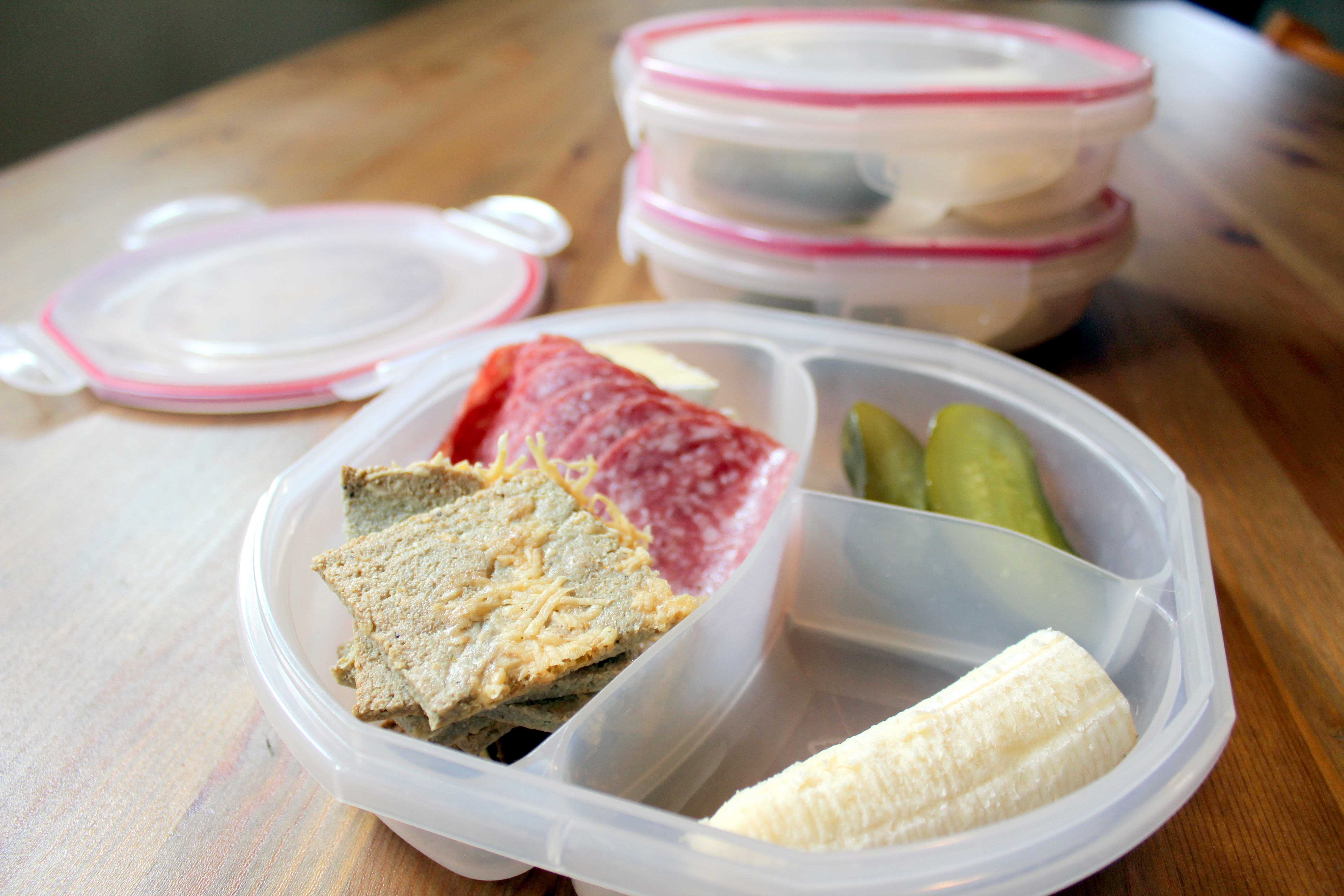
Meals do not need to be complicated!
6. Let go of shame, blame, and beating yourself up with realistic expectations.
You care, you are trying, and you are doing great! You aren’t going to get further by having negative inner self talk. This is something many of us need to work on re-phrasing, to give ourselves GRACE and understanding.
You have your own unique family situation, work situation, inner struggles, physical needs, and temperaments.
What works for some families might not work for yours. What works for your family won’t work for others.
We eat incredibly simply at my house. We have (grassfed) hotdogs at least once a week. I make scrambled eggs for breakfast most mornings. Cottage cheese, collagen powder, and frozen blueberries is another once-a-week or more often lunch. I buy Rx Bars even though I know how to make them.
There are times when certain things have to slide.
I just recently started sorting our lights and darks- I used to just dump everyone’s laundry in and wash on cold. Bing, bang, done- the clothes are clean, and it was one less step to do. Speaking of clothes, if folding is behind, my children often wear unmatched socks unless they match them themselves. They don’t care, and of the things that I care about, matching socks are really low on my list. This is okay.
You don’t need to make things fair, or burn yourself out trying. Our family does chores on Saturday morning, and out of the list of chores, I always let my least-compliant child pick what he’s going to do first. This preserves my energy, and the other kids really don’t care that much.
I don’t have a ‘system’ to decide who is riding in the front seat, and that isn’t ‘fair’ either- I usually put whatever child has been acting out most up with me. This isn’t a reward for acting out, rather, acting out tends to be a call for connection, and this is an easy way for me to meet that need. This is okay.
Read: Hold Onto Your Kids: Attachment Theory {Book Review}
There are times when your children can be told to go play in their rooms to preserve your last thread of patience. If you find yourself beating yourself up about this, you need to re-phrase that internal voice. You are providing your children with everything they need, and you also have needs! There is nothing wrong with telling them to go spend time in their rooms, or even admitting that you’re about to run out of patience!
There are times that the kids will watch too much TV, eat too much frozen pizza, and you won’t read to them all week. That’s okay!
It’s all okay, I promise you can’t shame yourself into doing more.
Read: A Food Blogger’s Confession
Get the 30 Days to a Healthy Family Checklist

Overwhelmed by making healthy changes? I want to help you get started - get my free checklist that will transform your family's health in 30 days, in small managable steps.

